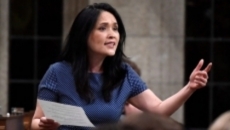OTTAWA - When Mary Simon, the first Indigenous governor general, delivered her first throne speech Tuesday, she stamped her mark on a centuries-old tradition, tracing its origins to an altercation that led to the beheading of an English monarch.
Delivered in the Senate, the ceremony surrounding the opening of Parliament hearkens back to a struggle in 1642 in the English House of Commons between an unpopular King and his MPs.
Canadians want to put this pandemic behind us - and they want bold, concrete solutions for the other challenges our country is facing. Watch live as @GGCanada delivers the Speech from the Throne and outlines how we’re going to meet this moment: https://t.co/qPtPUENnG7
— Justin Trudeau (@JustinTrudeau) November 23, 2021
Canada's throne speech closely mirrors the annual Queen's speech in the British Parliament — "the mother of all Parliaments," as the English like to boast.
Both are full of arcane traditions, not to mention anachronistic costumes, including frock coats and tricorn hats, banging on Parliamentary doors with an ebony staff, and a reluctant Speaker dragged to his seat, in a histrionic display of mock dread at being executed.
Pomp and circumstance aside, both Canada's throne speech and its counterpart in Britain have a practical purpose: to set out the government’s program for a fresh parliamentary session.
The throne speech, which is written by the government, does not just symbolize the start of a new parliament, but the primacy of the elected Commons over the unelected Senate — and its British counterpart the House of Lords — and the importance of democracy itself.
In the U.K. the Queen delivers the speech wearing her crown from an ornate throne in the House of Lords, as peers dressed in ermine robes look on.
In Canada, mirroring that tradition, her official representative, the Governor General, sits on a throne decorated with a gilded crown and sprays of maple leaves on a dais in the Senate.
The Queen has twice delivered Canada's throne speech herself: in 1957 during her first visit to Canada as a reigning monarch, and in 1977 during her silver jubilee tour.
The throne upon which she and the governor general sits is carved from white oak and features Queen Elizabeth II’s ER cipher. It includes a piece of English walnut from Windsor Great Park, outside the Queen's residence at Windsor Castle, which was donated to the Senate to be incorporated into the headpiece. The throne is emblazoned with the Latin motto of the Order of Canada: desiderantes meliorem patriam, meaning "they desire a better country.”
Simon delivered the speech in the Senate's recently acquired home in a grand former Ottawa railway station, built in 1912.
The usher of the black rod, the Queen's messenger in Parliament, who is also responsible for Senate security and other ceremonial duties, plays a key role in the ceremony. His position dates back to England in 1348.
During the ceremony, he heads from the Senate to the Commons and knocks on the door with his ebony staff, summoning MPs to the Senate to hear the speech from the throne.
This used to be a simple stroll down the hallway in Centre Block, but, with the main Parliament closed for renovations, the Senate is now located about three-quarters of a kilometre away. On Tuesday, an awaiting minibus drove him through the cold streets Ottawa to the Commons.
The usher of the black rod's summoning the Commons, on behalf of the Queen, symbolizes the House of Commons' independence from the British monarchy.
The practice dates back to England in 1642 and an altercation between King Charles I and MPs. It set in motion a string of events that led not only to his own beheading but a rule that meant a monarch would never enter the House of Commons chamber again.
In an act of provocation, the King entered the Commons chamber to try to arrest five members for treason. They had already fled, but his action was the catalyst for the English Civil War which led eventually to his execution.
In both Canada and England, the usher of the black rod walks to the Commons during the opening of Parliament and knocks three times with his ebony staff on the door.
In England, in a gesture asserting the independence of elected MPs, the door is slammed in his face before he is finally allowed to enter. In Canada, the Commons pronounces, more courteously, "admit the messenger." Addressing MPs, black rod then proclaims that "it is the pleasure" of the Governor General that they attend her in the Senate.
Wearing a frock coat and a tricorn hat, he escorts the MPs to the Senate, leading a procession that includes the sergeant-at-arms, who is his counterpart in the Commons, and the newly re-elected Speaker in the House of Commons, Liberal MP Anthony Rota, who formally introduces himself and asks the Crown to recognize the rights and privileges of MPs.
Again, because of the distance from the Commons, a string of black and white minibuses transported the procession — and the Commons' gilded silver ceremonial mace — through Ottawa to the neoclassical Senate building.
The first throne speech was delivered in Canada in 1867 and while the language is less florid, the ceremony surrounding it has altered very little.
It includes a piece of theatre in which the Speaker is dragged, not quite kicking and screaming but reluctantly, to his place by the prime minister and Opposition leader.
Addressing the Governor General, the Speaker insists, with contrived humility, that he is a "servant" of the House of the Commons and "but little able to perform the important duties thus assigned to me."
Historically, Speakers were considered an agent of the monarch, not a servant of the House of Commons, and their fate — in England — was not always a happy one.
Seven English Speakers were beheaded between 1394 and 1535, though, thankfully, no Canadian Speaker has met such a grisly fate.






